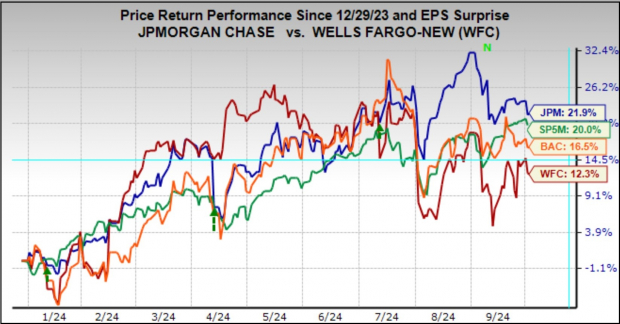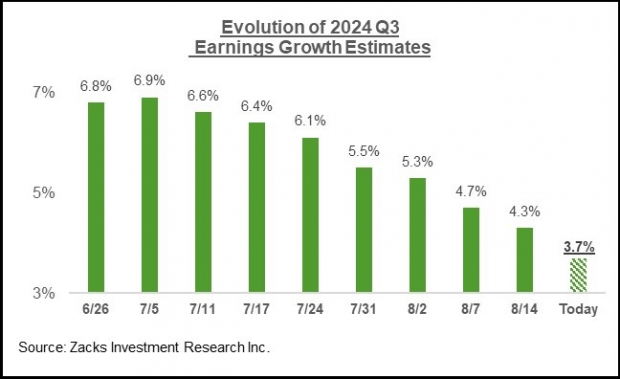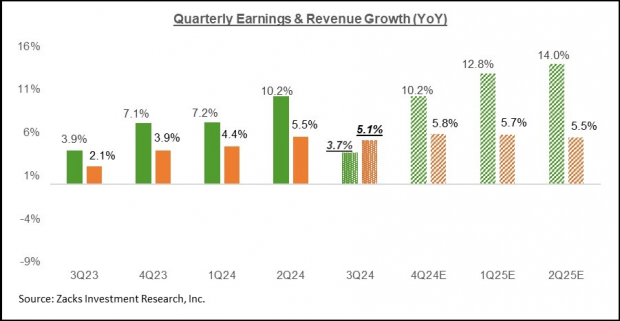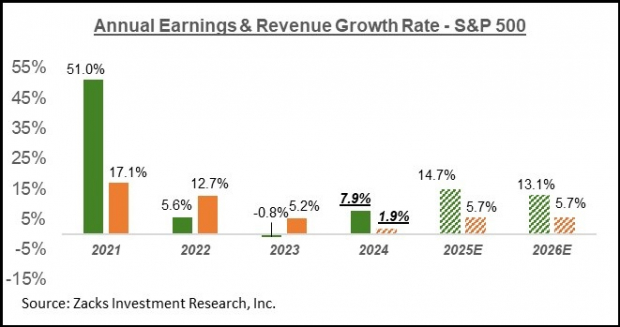Earnings Growth Set To Accelerate
Image Source: Unsplash
- Estimates for 2024 Q3 have come down since the start of the quarter on July 1st, with the magnitude of estimate cuts significantly bigger than what we had seen in the comparable periods of other recent quarters. This negative shift in the revisions trend reverses the prior favorable development on this front in recent quarters.
- Total S&P 500 earnings are currently expected to be up +3.7% from the same period last year on +5.1% higher revenues. Estimates have steadily come down since the start of the period, with the current +3.7% growth pace down from +6.9% at the start of July.
- Earnings growth is expected to accelerate after the modest growth in Q3, with double-digit earnings growth forecasted for the S&P 500 index in each of the following four quarters.
- Not only is the year-over-year growth pace in aggregate earnings expected to accelerate over the next four periods, but the absolute dollar level of quarterly earnings is expected to reach new all-time records in each quarter.
Looking Ahead to Bank Earnings
JPMorgan (JPM - Free Report) and Wells Fargo (WFC - Free Report) will kick off the Q3 earnings season for the Finance sector on Friday, October 11th. These stocks have struggled lately, with JPMorgan and Wells Fargo down -8.0% and -6.0% since the start of September, respectively, lagging the S&P 500 index’s +1.3% gain in that period.
Part of the issue has been JPMorgan’s downbeat commentary on the bank’s full-year 2025 net interest income and expense expectations. The big problem appears to be loan demand, which continues to be under pressure and whose outlook for the coming periods remains uncertain even though the Fed has started the easing cycle already.
Banking is an economically sensitive business that should benefit from a declining interest rate environment through improved loan demand, favorable deposit and credit quality trends, and more investment banking activities.
The current Zacks Consensus EPS estimate for JPMorgan is $16.72 on $172.03 billion in revenues, representing year-over-year changes of +3% and +8.8%, respectively. It appears that JPMorgan is trying to tame down expectations for next year, given the overall favorable tone of the revisions trend in recent months that drove the Zacks Consensus EPS estimate to rise by +3.4% over the last three months. Given the guidance, we would expect those estimates to retreat over the coming days.
The JPMorgan stock’s recent pullback notwithstanding, the stock remains a stellar performer this year, handily outperforming its peers and the broader market. You can see this in the chart below that shows the year-to-date performance of JPMorgan shares relative to the S&P 500 index, Bank of America, and Wells Fargo.

Image Source: Zacks Investment Research
For 2024 Q3, JPMorgan is expected to bring in $4.04 per share in earnings on $41.25 billion in revenues, representing year-over-year changes of -6.7% and +3.4%, respectively.
JPMorgan isn’t alone in having a Q3 earnings decline, as Bank of America (BAC - Free Report), Wells Fargo, and others are in the same category. The current Q3 Zacks Consensus EPS for Bank of America represents a -11% year-over-year decline, while the same for Wells Fargo is -8.6% below the year-earlier level.
For the Zacks Major Banks industry, of which all of these big banks are part, total Q3 earnings are expected to be -15.4% below the year-earlier level on +0.7% higher revenues, as the table below shows.

Image Source: Zacks Investment Research
Looking at the space as a whole, the core banking business has been under pressure for some time now, with compressed net interest margins and anemic loan demand keeping net interest income flat to modestly down. Credit quality metrics have steadily weakened and are currently above pre-Covid levels but still below the long-run historical levels. While inflation has started to ease, the combination of cumulative inflation over the cycle and the softening labor market will drive the Q3 credit quality metrics.
Given the moderating macroeconomic backdrop, these trends are still very much in place. But with monetary policy starting to ease already, we can expect the bottom to be not that far off.
Concerning the capital markets business, we should see continued strong year-over-year gains in investment banking and essentially flat trading activities. The capital markets business has been showing signs of steady improvement, with the trend expected to accelerate in the days ahead in response to easier Fed policy.
The Earnings Big Picture
We noted earlier how the revisions trend has been notably negative ahead of the start of the Q3 earnings season. You can see this in the chart below, which shows the evolution of Q3 earnings growth expectations since the start of the period.

Image Source: Zacks Investment Research
This is a more significant decline to estimates relative to the comparable periods for the two preceding quarters. The negative revisions trend is widespread and not concentrated in one or two sectors, with estimates for 14 of the 16 Zacks sectors getting cut over this period. The Tech and Finance sectors are the only ones enjoying positive estimate revisions over this period.
The negative revisions trend has been most pronounced for the Transportation and Energy sectors. We know that Energy sector estimates come under pressure when oil prices decline, with a softening oil price backdrop typically serving as a catalyst for positive estimate revision trends in the Transportation sector since fuel expenses are so costly. However, the weakening revisions trend for the Transportation sector shows that operators in the space are faced with softening demand trends as well.
The quarterly earnings growth pace is expected to improve from next quarter onwards. You can see this in the chart below that shows the overall earnings picture on a quarterly basis.

Image Source: Zacks Investment Research
The chart below shows the overall earnings picture on an annual basis.

Image Source: Zacks Investment Research
Please note that this year’s +7.9% earnings growth on only +1.9% top-line gains reflects revenue weakness in the Finance sector. Excluding the Finance sector, the earnings growth pace changes to +7.3%, and the revenue growth rate improves to +4.3%. In other words, about half of this year’s earnings growth comes from revenue growth, with margin gains accounting for the rest.
More By This Author:
Previewing The Q3 Earnings Season - Saturday, Sept. 28
Q3 Earnings Season: A Look Ahead
Q3 Earnings Loom: What Can Investors Expect?




